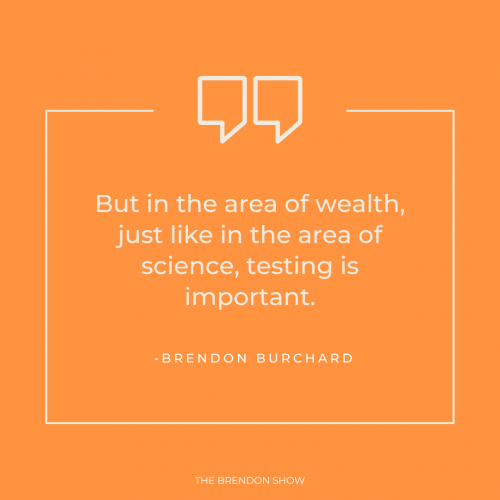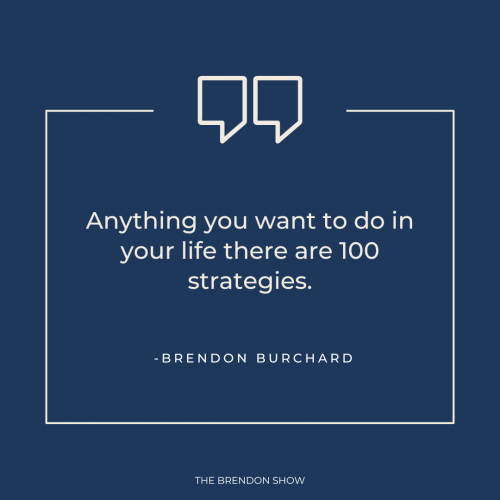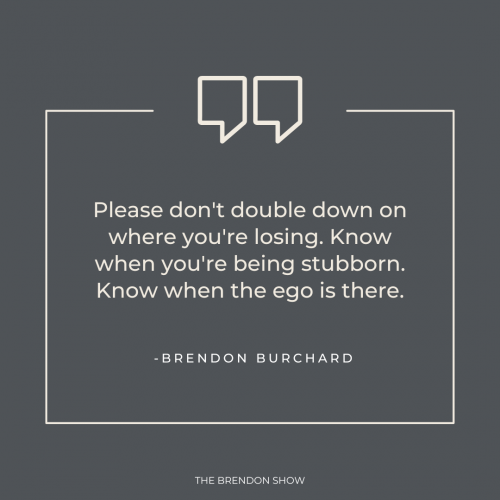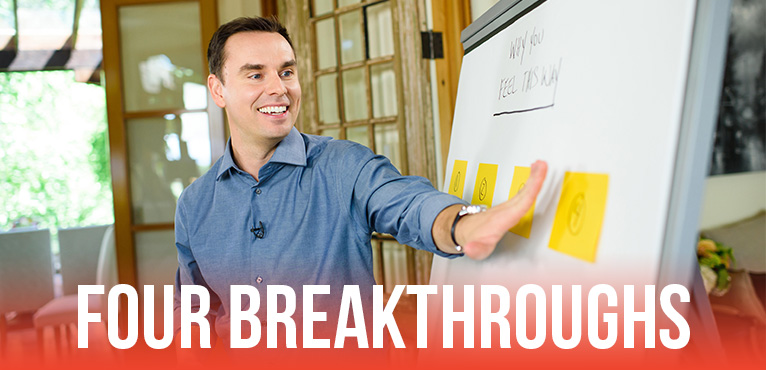SUMMARY
- “But in the area of wealth, just like in the area of science, testing is important. “
- What should you do when things aren’t working? If you’re using the right strategy, it’s best to keep your head down until you succeed…but when you’re using the wrong strategy, no amount of extra effort will make a difference. In this episode, learn how to discern when to double down and when to quit.
- “Please don’t double down on where you’re losing. Know when you’re being stubborn. Know when the ego is there.”
- When you assess your finances, do you see it as a science experiment or a rigid formula? Watch this short video as Brendon shares his perspective on the mindset necessary to build wealth long term and avoid unnecessary frustration.
- Watch the video to get the full training.
- Already have the High Performance Planner and CRUSHING each and every day? Let’s celebrate you! Take a photo with your planner and use #GrowthDay so we can find you on social media!
HOT NEWS & DEALS!
-
Get the Confidence Masterclass
Stop letting limiting beliefs and lack of confidence hold you back! Learn the SKILLS of confidence from 9 of the world’s best personal development experts in the most comprehensive Confidence training ever created! $400 worth of training – just $7.99 today! Get the Confidence Masterclass!
-
Get the GrowthDay app!
Make self-improvement a way of life and get the GrowthDay app! GrowthDay features all your personal development tools, coaching and community in one place. Write your journal, track your habits, take wellness challenges, watch live influencers teaching new life strategies, and join a global community of positive and supportive high achievers excited to improve their lives! Get the app on Apple app store here. Get on Android here. Get desktop here.
DID YOU KNOW?
I give weekly prizes, gratitude and shout-outs to our students, so post a screenshot or video on Instagram and use #TheBrendonShow! I can’t wait to hear your thoughts about this episode!



FULL TRANSCRIPT
[The following is the full transcript of this episode of The Brendon Show. Please note that this episode, like all TBS episodes, features Brendon speaking extemporaneously–he is unscripted and unedited. Filmed in one take, The Brendon Show has become one of the most viewed unscripted, direct-to-camera self-help series in the history of YouTube. It has also been the #1 Podcast in all of iTunes and is regularly in the top podcasts in the Self-Help and Health categories around the globe. Subscribe to the free motivational podcast on iTunes or Stitcher.)
This is all about ego. What happens is we start losing at something, we feel bad about it, we don’t want other people to see it or know it, so we just double down. I’m going to prove I’m right.
But in the area of wealth, just like in the area of science, testing is important.
Knowing what is working is important. Getting rid of the experiments that are not working is part of the scientific process. Who understands what I’m saying? Well, it’s the same thing with wealth. I think wealth generation is a very scientific process. You don’t always get it right, but at least one core piece about it is having a hypothesis, making sure you’re trying different experiments and seeing what’s working.
1. Be Willing to Change Gears
But what’s important in wealth is not to lose it. What’s important in wealth is when you’ve worked so hard to generate it, not to blow it on stupid stuff, or if you have a losing strategy, not to keep pouring into it. I have friends and family, and people, who’ll try something for 5, 10, 15, or 20 years. It’s not working. But they’re embarrassed to be seen quitting it to start something new because it would prove that they’re wrong; and people don’t like to be proved that they’re wrong, especially insecure people, especially people who have their egos wrapped up in something. Especially people who don’t want to learn. Especially people who are easily embarrassed when things don’t turn out right. Because they’ve been taught or they believe that by being wrong, they’re bad and they cannot see themselves as bad. So they get defensive. When they get defensive, they get stubborn. When they get stubborn, they double down. Does anyone know someone like this? Be honest. Yeah. This is a big one. This ruins families. This ruins finances. This ruins your future.
2. Don’t be Afraid to Go to Therapy
And you have to know when you’re just being stubborn when your actions are causing losses over and over and you keep repeating them. This is often where gambling or addiction comes into play. And when this comes into play, sometimes you need to know, did you have to raise your hand and ask for professional help? Sometimes you need to tell a family or friend that they might need professional help. Some of you have had to do interventions with family. Take away credit cards. Tell them, you know, give them, you know, take away access to bank accounts. I know when I talk to a global community, that stuff has happened here. And I’m here to say without any judgment, I understand how hard that is. As I said, I had people very close to my life who followed this strategy, and sometimes they could control and sometimes they could not. So I don’t make light of this. We take on topics like this. This is tough stuff. However, I need you to know today, have you been doubling down on a losing strategy? Something that is just not working and you keep pouring money into it? Now there is an investment in skill development as we’ll talk about later. There is an investment in your life. And if you feel like, hey, you’re gaining mastery, you’re getting better, and that increases the odds dramatically of that thing turning around and you make it go, okay, I understand it. I did that myself. Right.
3. Learning Skills Are Okay
I’ll give you an example of me. I was somebody who invested a lot of time, energy, and effort in learning the new skills that would become my future career. And in my first year or two, it didn’t look good. And I had to have this honest sit down with myself, with the journal, with that green tea, and go, is this going to work? Is it going to work because I’m going to develop the skill? I’m going to apply myself. I’m going to stay consistent. I’m going to be around good people. I’m going to keep trying. Is this going to work because I’ve seen it work for other people? Is this going to work because there’s evidence that there’s progress here? Is it going to work because there’s evidence of gaining skill here or is this a total dead end? And I need to be honest with myself.
4. Rely on Data, Not Self-Esteem
Now, here’s the issue. Notice I didn’t make that about self-esteem. Because when I was starting, my self-esteem would have said, you know, double down on this. Well, I’m not very good at this. I’m not smart, I’m not capable. I’ve never done this before. My self-esteem would’ve said stop, but instead, I look for evidence. Have other people done this? Is there progress? Am I gaining skill and mastery? Is there a clear path? Are there people around me who are doing this and it’s obvious that they’ve figured out a strategy that is very clear? There’s no hocus pocus, there’s no lack of transparency like these are what the things they’re doing. Do I have a clear plan? That wasn’t about me it was about whether is there some evidence. Is there a plan? Can I execute it? Okay. I kept going. I kept going. And I’m glad in that moment that I did double down. Now, however, I didn’t double down irresponsibly, even though it wasn’t going well. Even though I felt like so many days were failures, there was evidence of a path. There was evidence of a peer group doing this. There was evidence of progress there. There was evidence eventually of, okay, this is working. Hey, look, people are opting in. People are buying the book. People are, you know, signing me up. Okay. I can see this thing scaling. Got it. All right. Let me keep investing there.
5. Above All, Be Flexible
But also along the way, I can tell you as someone running a business, there’s been so many losing marketing campaigns, losing ideas, and losing business along the way. I just had to go, not working. Kill it. Just, it’s just not right. Look at the evidence. It’s not progressing. It’s not getting the numbers. It’s not scaling. It’s just not working. Let’s change our strategy. Let’s leave it. Because what I tell people is you can always find lots of other strategies that also get you to where you want to go and can bring you joy and connection and fulfillment.
Anything you want to do in your life there are 100 strategies.
Anything. Think about parenting. Hundreds of strategies, right, to find your way authentically and to connect with your child. There are hundreds of ways to develop skills. There are hundreds of businesses. There’s I mean, literally, there’s like, there’s an infinite number of strategies in some ways to do something. Your job is to find those ones to speak to you, to try them, to have a plan, to see something, someone else has tried to do. Model them. Find your own way within it. But listen, if it’s not working, you have to choose when to quit it. You have to choose. And the most important thing when it comes to wealth is to not double down on things that are not working because something else could. Right. Same thing in investing, right? This can be as tactically as, hey, you invest in the stock, you’re watching the stock, and you keep pouring into it every month for six, seven months. And you’re watching it. You’re pouring into it six, seven months. It’s not doing anything. Well, remember, there’s another strategy. Well, you look at all these other stocks, they happen to be growing and they’re doing fine. Maybe I need to evaluate if this one is where I should keep pouring into or if should I diversify. Right? That’s the basis of what a lot of people talk about in wealth management understanding, “oh, I put all my eggs in this basket. It’s not turned out well. Let me make sure I’m more diversified, so I don’t lose.” You all follow what we’re talking about here.
6. Keep The Parts That Work
Please don’t double down on where you’re losing. Know when you’re being stubborn. Know when the ego is there.
Know when you’re embarrassed to quit and say, You know what? Instead of being embarrassed to quit something, let me be okay with the fact that quitting or stopping this thing that is hurting me or my family or my finances, stopping might actually be the thing that brings me to the next level of abundance.


